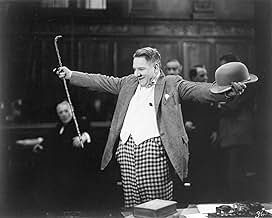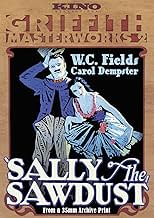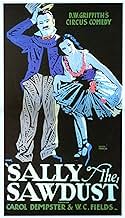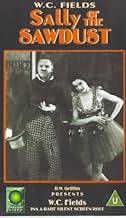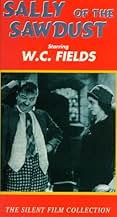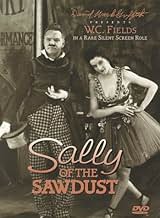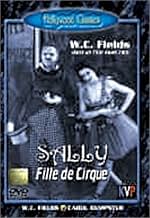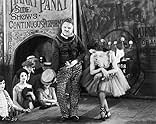Füge eine Handlung in deiner Sprache hinzuJudge Foster throws his daughter out because she married a circus man. She leaves her baby girl with Prof. McGargle before she dies. Years later Sally is a dancer with whom Peyton, a son of ... Alles lesenJudge Foster throws his daughter out because she married a circus man. She leaves her baby girl with Prof. McGargle before she dies. Years later Sally is a dancer with whom Peyton, a son of Judge Foster's friend, falls in love. When Sally is arrested McGargle proves her real pare... Alles lesenJudge Foster throws his daughter out because she married a circus man. She leaves her baby girl with Prof. McGargle before she dies. Years later Sally is a dancer with whom Peyton, a son of Judge Foster's friend, falls in love. When Sally is arrested McGargle proves her real parentage.
- Regie
- Drehbuch
- Hauptbesetzung
- Auszeichnungen
- 3 wins total
- Leon - the Acrobat
- (as Glen Anders)
- Stooge
- (Nicht genannt)
- Bandit
- (Nicht genannt)
- Bit Role
- (Nicht genannt)
- Yokel in the Old Army Game
- (Nicht genannt)
Empfohlene Bewertungen
This is not, of course, D. W. Griffith's masterpiece, but it does showcase his film-making savvy in full maturity. He uses all his innovations, which are techniques we take for granted now: close- ups, cross-cutting, a mobile camera, and the ability to modify acting from theatrical exaggeration to cinematic subtlety.
W. C. Fields also showcases his skills-- not his signature gruff delivery, but his remarkable dexterity as a physical comedian. He does a few inventive juggling acts, cut too short to be fully appreciated, and some very deft pickpocketing, but it seems that every prop that comes within reach gets manipulated for comic effect-- hat, cane, car roof, dog, cash. He's a joy to behold.
Much has been said against Carol Dempster as an actress, but not by me. She was 22 at the time, playing a teenager, and her combination of grace and awkwardness is engaging, particularly when she dances. She's not a beauty-- though she's positively luminous in the scene where she's gussied up like a Talmadge sister-- but her plainness enhances her simple affection for Fields, her guardian.
Finally, there is Alfred Lunt in one of his rare film roles, as a dashing leading man. He and his British wife Lynne Fontane (a lavender marriage) made one talkie together-- a wonderfully funny one, "The Guardsman," in 1931-- after which they quit movies forever for the Broadway stage, where they reigned from 1923 to 1957. So famous and powerful were they that they would only accept theatrical contracts which allowed them to work together. As for movies, Fontanne wrote to the Hollywood producer who tried to lure them back with huge flippin' wadges of cash, "We can be bought, but we cannot be bored."
Before Sally is born her well bred and off mother decides to run off with a show person against parents wishes and is disowned. With the father dead and the mother dying Poppy (Fields) agrees to return the child to her parents but then he decides to raise her himself. Together they tour and perform into her adulthood when the day of reckoning approaches, further complicated by Sally's romance with a swell and member of her grandparents polite society who disdain show people.
Directed by D.W. Griffith in the latter half of his career, Sally has a dated look for a 25 silent with many scenes hearkening back to his halcyon period a decade earlier as his famous montage style looks more like a Mack Sennett Keystone short in spots. Once again he focuses on societal hypocrisy and intolerance but it comes across hackneyed. Silent film had moved into its golden era and Griffith remained inert while Vidor, DeMille and Ingram were taking form and content to another level.
Fields is both funny and touching as he protects Sally and tries to make a living in a variety of dubious enterprises. Dempster is remarkably agile as she takes her licks in more than one scene as well as have a chameleon like look that goes from homely tomboy to deco sleek vamp. It is the energy and talent of both that carry Sally as they leave D.W. anachronistic style in the dust.
However, he was not the "star" of this movie. That title would go to Carol Dempster. Dempster is something of a polarizing figure for silent film fans. Many have labeled her as a talentless and unattractive Lillian Gish wannabe whose supposedly awful performances led to DW Griffith's creative and commercial downfall. It's true that Dempster could be inconsistent as a performer, but when she was good, she was superb. Dempster really appears to enjoy this role, and it shows. She is by turns irreverent, spunky, feisty, happy, and touchingly sad; you can see the ache in Sally's heart as she yearns for the love of family. Dempster is highly expressive and uses her trademark athleticism and dancing skills to great effect. She radiates a kooky charm throughout and many of her facial expressions are amusing. I personally thought she carried the role very well, and I have watched this movie multiple times in order to relive moments from her performance.
As a movie overall, the film has its strengths and weaknesses. Griffith had obviously mastered the art of cinematography and there are some nice sequences at the circus, as well as the protracted chase scene near the end of the movie. The editing, as has been noted above, is comically bad. The most outstanding example is when the cops come to bust McGargle's shell game operation and take Sally away, it's clearly night time, but the cut to McGargle's escape is in broad daylight! Also, as has been noted, Griffith was NOT a comedy director. One can only imagine the zaniness that Buster Keaton or Hal Roach would have brought to the chase scene, but Griffith doesn't have the right feel for it. The movie is more amusing than laugh-out-loud funny. Whatever does work in the movie is more due to the cast (minus Alfred Lunt, whom I found very bland as the would-be boyfriend) than the script or direction.
In conclusion, SALLY OF THE SAWDUST, while not a "great" film, has two great performances (by Fields and Dempster) and is an agreeable way for silent movie fans to spend two hours.
The breathtaking beauty of earlier D.W. Griffith-directed films is noticeably absent. While some of the shots are lovely, nothing equals the artfulness evident throughout many past Griffith efforts. "Sally of the Sawdust" is beautifully preserved (if only all Griffith prints were as well preserved); and, it is an enjoyable comedy (certainly more so in 1925). It was adapted from Dorothy Donnelly's popular play "Poppy" (1923), with Madge Kennedy and W.C. Fields. It was re-filmed as "Poppy" (1936), with Rochelle Hudson and W.C. Fields. Norma Talmadge's popular film was an altogether different "Poppy" (1917), and did not co-star W.C. Fields.
***** Sally of the Sawdust (8/2/25) D.W. Griffith ~ Carol Dempster, W.C. Fields, Alfred Lunt
Carol Dempster is quite mixed. I tend to find her unremarkable in most of her work and she only tended to shine in less glamorous/winsome roles (see ISN'T LIFE WONDERFUL for a genuinely great performance from her). Here, she veers between outright badness and inspired in what might be the most uneven performance of her short career. It often does not feel like she's playing a character so much as employing several facial tics repetitively in front of the camera: she winks, she coos, she does little dancing motions. It's supposed to come off as peppy but it often grates. Her emotional scenes are disastrous, complete with shameless mugging. However, Dempster excels in the physical scenes, like when she escapes a courthouse through a high window or when she's interacting with an elephant. I maintain that Dempster was best at playing active, everyday characters and not the Victorian girl-women Griffith liked to populate his movies with.
SALLY OF THE SAWDUST was one of Griffith's last films and is quite unlike anything else in his filmography. It's definitely worth seeing, though if you've never seen a silent movie before, I would not make this one your first.
Wusstest du schon
- WissenswertesD.W. Griffith had good reason not to use the name or title "Poppy" for this movie -a movie titled "Poppy" with a character by that name had come out in 1917.
- PatzerWhen Sally and Eustache were lying on the railway, after get wet on the train, you can clearly see that the railway ends on the film studio wall, right behind them.
- VerbindungenFeatured in W.C. Fields: Straight Up (1986)
Top-Auswahl
Details
Box Office
- Bruttoertrag in den USA und Kanada
- 304.081 $
- Laufzeit
- 1 Std. 44 Min.(104 min)
- Sound-Mix
- Seitenverhältnis
- 1.33 : 1

